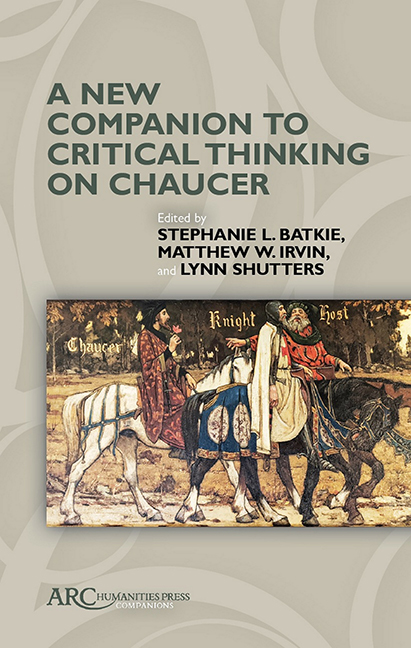Book contents
Memorie
Published online by Cambridge University Press: 21 October 2021
Summary
Anelida and Arcite
Troilus and Criseyde
Retraction
CHAUCER'S EARLY FORMALLY experimental love-complaint Anelida and Arcite (ca. 1380) looks like a try-out— the poem is apparently unfinished—for his later tragic romance Troilus and Criseyde (ca. 1382), although it memorializes a woman betrayed by a man, rather than a man betrayed by a woman, and its setting is Thebes, not Troy. Invoking the aid of the classical gods Mars, Bellona, and Pallas Athena, the narrator declares that he will write an English version of the classical story of Queen Anelida and her faithless lover, the Theban knight Arcite, because that story is one that
elde, which that al can frete and bite,
As hit hath freten mony a noble storie,
Hath nygh devoured out of oure memorie.
(Anelida, 12–14)The idea that writing preserves the memory of stories that would otherwise be forgotten due to the ravages of time is of course common in both late antiquity—in Horace's Odes, for example—and the Middle Ages. In his Etymologies, the Spanish encyclopedist Isidore of Seville (ca. 560–636) claims that “[t] he use of letters was invented for the sake of remembering things, which are bound by letters lest they slip away into oblivion” (1.3.2). But although Isidore appears to suggest that writing is merely a support for the oral faculty of memory, the critic Mary Carruthers argues that medieval texts make no distinction in kind between “writing on the memory and on some other surface,” that is, they not only view writing as a form of memorization but memory itself as a form of writing. This is an important corrective to the idea that memory in the Middle Ages was unreflective and that it had an organic connection to lived experience. Although Isidore refers to “things” in general, rather than “noble stories,” he later yokes the “monument” (a commemorative object, such as a literary text) and memory through their shared etymology: “both ‘monument’ and ‘memory’ (memoria) are so called from ‘the admonition of the mind’ (mentis admonitio)” (15.11.1). This etymological convergence underlines the idea, crucial to medieval thought, that there is an ethical imperative (mentis admonitio)—and, we might also argue, a political imperative—to remember.
- Type
- Chapter
- Information
- A New Companion to Critical Thinking on Chaucer , pp. 285 - 300Publisher: Amsterdam University PressPrint publication year: 2021

